musthavedone反义疑问
musthavedone反义疑问句的用法归纳

musthavedone反义疑问句的用法归纳反义疑问句是由两个简单句构成的句子,用来表示一种陈述或命令是否正确,同时给出另一种推测或期待的情况。
其中,must have done是一种形式,用来表示对过去发生的事情的推测。
本文将从反义疑问句的定义、结构和用法,以及must have done反义疑问句的形成和用法等方面进行详细阐述。
第一部分:反义疑问句的定义、结构和用法一、定义:反义疑问句是由一个主句和一个附属疑问句构成的复合句。
主句陈述一个事实或提出一个命令,附属疑问句则对这个事实或命令提出质疑或做出推测。
二、结构:反义疑问句的结构较为固定,主要由以下三个部分构成:1. 主句:陈述一个事实或提出一个命令,通常采用陈述句的形式。
2. 附属疑问句:对主句中的事实或命令提出质疑或做出推测,通常由助动词或情态动词与主语构成。
3. 标点符号:主句和附属疑问句之间用逗号隔开。
三、用法:反义疑问句常用于以下情况:1. 对事实或命令提出疑问:我认为某个事实是正确的,但不确定,因此提出一个相反的疑问。
例如:"你去过巴黎,是吗?"2. 对期待的情况进行推测:我希望某个事情会发生,但不确定,因此做出一个相反的推测。
例如:"他一定会来参加聚会,对不对?"第二部分:must have done反义疑问句的形成和用法一、形成:must have done是一种用来表示对过去发生的事情的推测的形式。
其反义疑问句的构成通常采用以下结构:1. 主句:主语+ must have done2. 附属疑问句:附属疑问句通常由助动词或情态动词与主语构成,并与主句的动词形式相对应。
二、用法:must have done反义疑问句可以用于以下情况:1. 对过去发生的事情表示推测和质疑:我认为某个事情在过去已经发生,但不确定,因此提出一个相反的疑问。
例如:"他一定去过巴黎,对吗?"2. 对过去没有发生的事情表示推测和期待:我希望某个事情在过去发生,但不确定,因此做出一个相反的推测。
must反义疑问句教学文稿

精品文档精品文档Must相关的反义疑问句反义疑问句最大最主要考点1.must have done.表示对过去某事的肯定猜测,翻译成: 准是…一定…其否定或疑问形式都用can/could来表示。
例如:since the road is wet,it must have rained last night.2;当然对现在发生或者将来发生的事情,要用must do表示猜测,否定为can’t dohe must understand that we mean business.You must be hungry after a long walk.反意疑问句中含有Must的情况主要有以下几种:1)作为情态动词表“必须”,这时反意疑问句直接用mustn'/needn't2)当must表示推测时又分以下几种情况:a:对现在事实的推测,反意疑问句与must后面的动词呼应,如:You must be joking,aren't you ?b:对过去事实的推测,表示动作的时候用did 当助动词,表示状态时用was,如:Mr Green must have been punished for his being rude at the meeting,didn‘t he ?(格林先生一定因为昨天在会上鲁莽的行为被处罚了,是吗?)被处罚表示一个动作She must have been a policeman ,wasn't she ?(她过去一定是个警察,是吗?)是警察表示一种状态对现在情况的推测,问句部分用主动词(do, be)一般现在时的适当形式。
若是现在进行时,问句部分用现在进行时的适当形式表示。
若是there be结构,问句用isn't/aren't there。
如:1)He must be there, isn't he?2)He must have a big family, doesn't he?3)He must be waiting outside, isn't he?4)There must be some students in the room, aren't there?对已发生的过去情况的推测,若陈述句谓语部分有“must have done”,而且有表示过去的时间状语,问句部分用didn't;若没有表示过去的时间状语,问句部分用haven't或hasn't。
must have done的反义疑问句Microsoft Word 文档
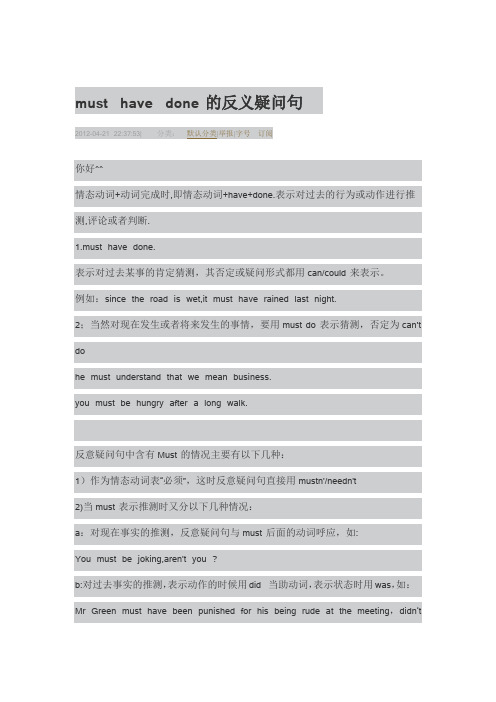
must have done的反义疑问句2012-04-21 22:37:53| 分类:默认分类|举报|字号订阅你好^^情态动词+动词完成时,即情态动词+have+done.表示对过去的行为或动作进行推测,评论或者判断.1.must have done.表示对过去某事的肯定猜测,其否定或疑问形式都用can/could来表示。
例如:since the road is wet,it must have rained last night.2;当然对现在发生或者将来发生的事情,要用must do表示猜测,否定为can‟t dohe must understand that we mean business.you must be hungry after a long walk.反意疑问句中含有Must的情况主要有以下几种:1)作为情态动词表“必须”,这时反意疑问句直接用mustn'/needn't2)当must表示推测时又分以下几种情况:a:对现在事实的推测,反意疑问句与must后面的动词呼应,如:You must be joking,aren't you ?b:对过去事实的推测,表示动作的时候用did 当助动词,表示状态时用was,如:Mr Green must have been punished for his being rude at the meeting,didn…t he ?(格林先生一定因为昨天在会上鲁莽的行为被处罚了,是吗?)被处罚表示一个动作She must have been a policeman ,wasn't she ?(她过去一定是个警察,是吗?)是警察表示一种状态对现在情况的推测,问句部分用主动词(do,be)一般现在时的适当形式。
若是现在进行时,问句部分用现在进行时的适当形式表示。
若是there be结构,问句用isn't/aren't there。
(完整版)含有must时,反义疑问句的归纳
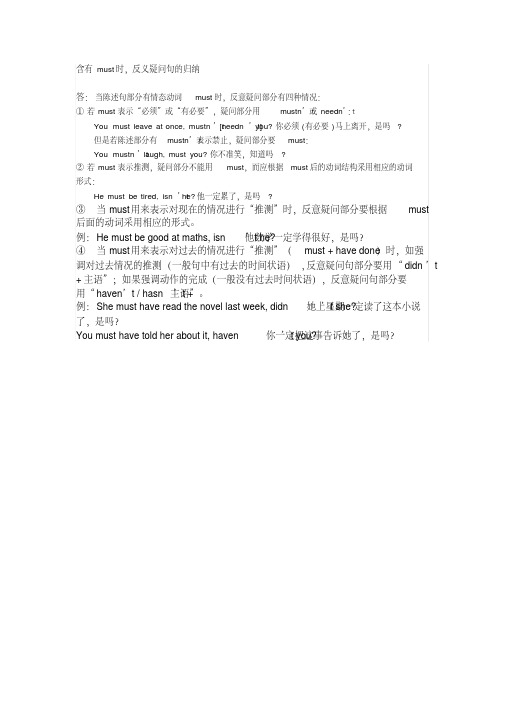
含有must时,反义疑问句的归纳
答:当陈述句部分有情态动词must时,反意疑问部分有四种情况:
:
①若must表示“必须”或“有必要”,疑问部分用mustn’t或needn’t
you?你必须(有必要)马上离开,是吗?
You must leave at once, mustn’t [needn’t]
但是若陈述部分有mustn’t表示禁止,疑问部分要must:
You mustn’t laugh, must you?你不准笑,知道吗?
②若must表示推测,疑问部分不能用must,而应根据must后的动词结构采用相应的动词
形式:
he?他一定累了,是吗?
He must be tired, isn’t
③当must用来表示对现在的情况进行“推测”时,反意疑问部分要根据must 后面的动词采用相应的形式。
他数学一定学得很好,是吗?
例:He must be good at maths, isn’t he?
④当must用来表示对过去的情况进行“推测”(must + have done)时,如强
调对过去情况的推测(一般句中有过去的时间状语),反意疑问句部分要用“didn’t + 主语”;如果强调动作的完成(一般没有过去时间状语),反意疑问句部分要
主语”。
用“haven’t / hasn’t +
她上星期一定读了这本小说例:She must have read the novel last week, didn’t she?
了,是吗?
你一定把这事告诉她了,是吗?
You must have told her about it, haven’t you?。
must的反义疑问句

• 若是被动,应按被动结构来处理。如: 1)The room must have been cleaned yesterday, wasn't it? • 2)The room must have been cleaned, hasn't it?
• 若句中有表示过去完成时的时间状语,问 句部分应用hadn't.如: They must have learnt 5000 English words by the end of last term, hadn't they? (本题中must表推测, 如果将它去掉,还原为真实句就是They had learnt 5000 English words by the end of last term.因此,反意问句是hadn't)
1-5 BCACB 6-10BCABA 11-15 CBAAB 16-20CACBA
月考卷答案: 21-25 BACBD 26-30 CCBDD 31-35 ADBCD 36-40 DCBAC 41-45 DBACD 46-50 BABCD 51-55 ACDBA 56-60 BAADA 61-65BDADA 66-70 BCBAD 71-75 DBADB
1. up 后加to 2. up 后加 with 3. was come 该改为came Ⅰ.1.voyage 2. native 3. vocabulary tter 5. fluent 6. identity Ⅱ. 1.actually 2. gradually 3. official 4. spelling Ⅲ. from 2.At ; over 3. in 4. with 5. on / upon Ⅳ.1 The number of 2. a number of
musthavedone反义疑问句的用法归纳
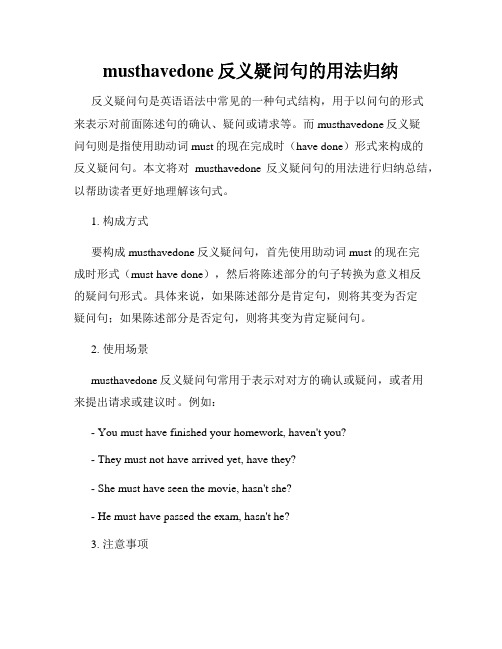
musthavedone反义疑问句的用法归纳反义疑问句是英语语法中常见的一种句式结构,用于以问句的形式来表示对前面陈述句的确认、疑问或请求等。
而musthavedone反义疑问句则是指使用助动词must的现在完成时(have done)形式来构成的反义疑问句。
本文将对musthavedone反义疑问句的用法进行归纳总结,以帮助读者更好地理解该句式。
1. 构成方式要构成musthavedone反义疑问句,首先使用助动词must的现在完成时形式(must have done),然后将陈述部分的句子转换为意义相反的疑问句形式。
具体来说,如果陈述部分是肯定句,则将其变为否定疑问句;如果陈述部分是否定句,则将其变为肯定疑问句。
2. 使用场景musthavedone反义疑问句常用于表示对对方的确认或疑问,或者用来提出请求或建议时。
例如:- You must have finished your homework, haven't you?- They must not have arrived yet, have they?- She must have seen the movie, hasn't she?- He must have passed the exam, hasn't he?3. 注意事项(1)在musthavedone反义疑问句中,陈述部分的动词通常使用过去分词形式(done)。
需要注意的是,过去分词的形式要与主语保持一致。
(2)助动词must的变体形式要根据所使用的人称和时态进行调整。
例如,如果陈述部分是现在完成时,那么助动词must必须是must have done的形式。
(3)反义疑问句的疑问部分的语序与一般疑问句相同,即将助动词提前至主语之前。
4.表示肯定的陈述部分在使用musthavedone反义疑问句时,如果陈述部分是肯定的,则将其转换为否定疑问句。
例如:- You must have finished your homework, haven't you?- They must have won the game, haven't they?- She must have visited her parents, hasn't she?- He must have bought a new car, hasn't he?在这些例句中,陈述部分都是肯定句,通过将其转换为否定疑问句,可以表示对所陈述事实的确认,并且期待对方给出与自己观点相反的回答。
must-have-done-的反意疑问句答疑

情态动词+动词完成时,即情态动词+have+done。
表示对过去的行为或动作进行推测,评论或者判断。
1。
must have done.表示对过去某事的肯定猜测,其否定或疑问形式都用can/could来表示.例如:Since the road is wet, it must have rained last night.2;当然对现在发生或者将来发生的事情,要用must do表示猜测,否定为can't do He must understand that we mean business。
You must be hungry after a long walk.反意疑问句中含有Must的情况主要有以下几种:1)作为情态动词表“必须",这时反意疑问句直接用mustn’t/needn’t2)当must表示推测时又分以下几种情况:a:对现在事实的推测,反意疑问句与must后面的动词呼应,如:You must be joking, aren't you?b:对过去事实的推测,表示动作的时候用did 当助动词,表示状态时用was,如:Mr Green must have been punished for his being rude at the meeting,didn‘t he ?(格林先生一定因为昨天在会上鲁莽的行为被处罚了,是吗?)被处罚表示一个动作She must have been a policeman ,wasn't she ?(她过去一定是个警察,是吗?)是警察表示一种状态对现在情况的推测,问句部分用主动词(do,be)一般现在时的适当形式。
若是现在进行时,问句部分用现在进行时的适当形式表示。
若是there be结构,问句用isn't/aren’t there.如:1)He must be there,isn't he?2)He must have a big family, doesn’t he?3)He must be waiting outside, isn’t he?4)There must be some students in the room, aren’t there?对已发生的过去情况的推测,若陈述句谓语部分有“must have done”,而且有表示过去的时间状语,问句部分用didn’t;若没有表示过去的时间状语,问句部分用haven’t或hasn't。
推测反义疑问句

(2)当must+have done表示对过去的情况进行推 测(一般句中有明确的过去时间状语),问句要 根据陈述部分谓语的情况用“didn't+主语”或 “wasn't/weren't+主语”;如果强调动作的完成 (一般没有明确的过去时间状语),问句要用 “haven't/hasn't+主语”。
She must have read the novel last week,didn't she? 她上星期一定读了这本小说,是吗?
1 带 have to 时,附加疑问用 do 或 have的相应形式 , 用 do 更常见。 You don’t have to go to school on Sundays , do you ? We have to work today , don’t we ? (haven’t we ?)2 带 must时A 表示“必须”,附加疑问部分用 mustn’t We must work hard , mustn’t we ?B 表示“有必要”时,附加疑问部分用 needn’t. The teacher must show concern for each pupil , needn’t he ?C 表示“推测”时,附加疑问部分要与陈述部分的谓语动词 相呼应。 He must be a teacher, isn’t he ? D must + have + done 是对过去情况的推测,当陈述部分没有明确的表示过去 的时间状语时,附加疑问要用have的相应形式;当陈述部分有 明确的过去时间状语时,附加疑问要用过去时。 You must have lived here for a long time , haven’t you ? You must have seen him yesterday , didn’t you ?E 当陈述部分是 must not , 表示“一定不要” 、“禁止”时,附加疑问除用must 外, 还可以用may. I must not tell him , must I ? ( may I ?)3 带 used to 时,附加疑问用 usedn’t 或didn’t . 但口语中倾向于后 者。 There used to be an apple tree in the garden , didn’t there ? (usedn’t there ? )4 带need 时,附加疑问用 do 或 need ,应该与陈述部分 need 用法相呼应。 I needn’t tell you the answer , need I ? You need to buy a better dictionary , don’t you ?5 带ought to 时,附加疑问用ought. , 但在美国英语 中用should We ought to help each other , oughtn’t we ? / shouldn’t we ?
must_have_done用法
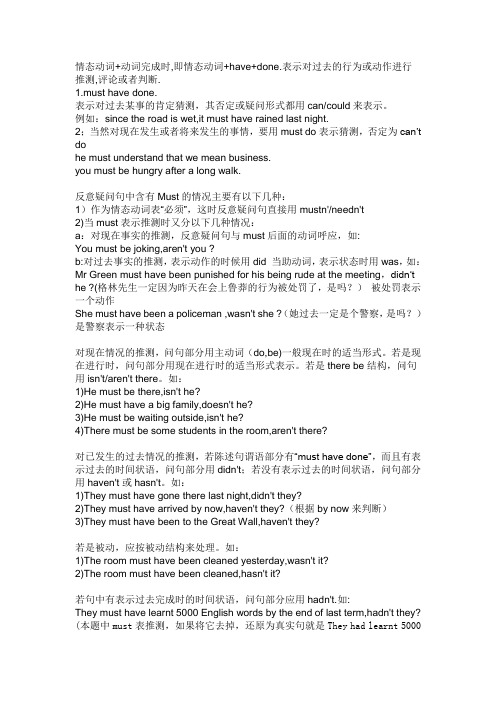
情态动词+动词完成时,即情态动词+have+done.表示对过去的行为或动作进行推测,评论或者判断.1.must have done.表示对过去某事的肯定猜测,其否定或疑问形式都用can/could来表示。
例如:since the road is wet,it must have rained last night.2;当然对现在发生或者将来发生的事情,要用must do表示猜测,否定为can’t dohe must understand that we mean business.you must be hungry after a long walk.反意疑问句中含有Must的情况主要有以下几种:1)作为情态动词表“必须”,这时反意疑问句直接用mustn'/needn't2)当must表示推测时又分以下几种情况:a:对现在事实的推测,反意疑问句与must后面的动词呼应,如:You must be joking,aren't you ?b:对过去事实的推测,表示动作的时候用did 当助动词,表示状态时用was,如:Mr Green must have been punished for his being rude at the meeting,didn‘t he ?(格林先生一定因为昨天在会上鲁莽的行为被处罚了,是吗?)被处罚表示一个动作She must have been a policeman ,wasn't she ?(她过去一定是个警察,是吗?)是警察表示一种状态对现在情况的推测,问句部分用主动词(do,be)一般现在时的适当形式。
若是现在进行时,问句部分用现在进行时的适当形式表示。
若是there be结构,问句用isn't/aren't there。
如:1)He must be there,isn't he?2)He must have a big family,doesn't he?3)He must be waiting outside,isn't he?4)There must be some students in the room,aren't there?对已发生的过去情况的推测,若陈述句谓语部分有“must have done”,而且有表示过去的时间状语,问句部分用didn't;若没有表示过去的时间状语,问句部分用haven't或hasn't。
含有must的反义疑问句
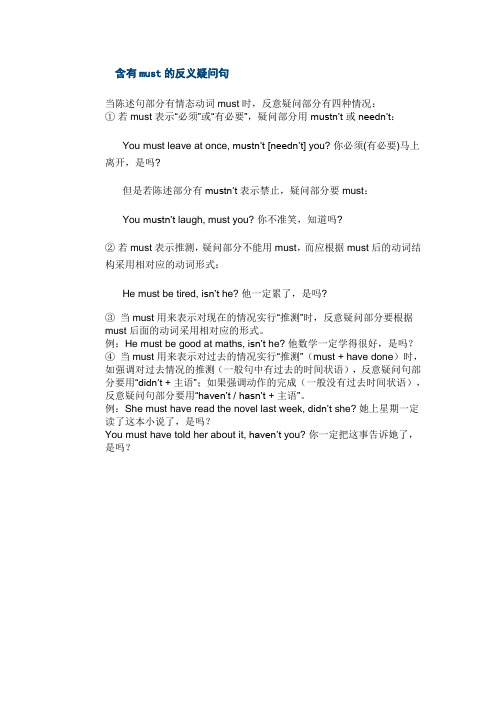
含有must的反义疑问句
当陈述句部分有情态动词must时,反意疑问部分有四种情况:
①若must表示“必须”或“有必要”,疑问部分用mustn’t或needn’t:
You must leave at once, mustn’t[needn’t] you? 你必须(有必要)马上离开,是吗?
但是若陈述部分有mustn’t表示禁止,疑问部分要must:
You mustn’t laugh, must you? 你不准笑,知道吗?
②若must表示推测,疑问部分不能用must,而应根据must后的动词结构采用相对应的动词形式:
He must be tired, isn’t he? 他一定累了,是吗?
③当must用来表示对现在的情况实行“推测”时,反意疑问部分要根据must后面的动词采用相对应的形式。
例:He must be good at maths, isn’t he? 他数学一定学得很好,是吗?
④当must用来表示对过去的情况实行“推测”(must + have done)时,如强调对过去情况的推测(一般句中有过去的时间状语),反意疑问句部分要用“didn’t + 主语”;如果强调动作的完成(一般没有过去时间状语),反意疑问句部分要用“haven’t / hasn’t + 主语”。
例:She must have read the novel last week, didn’t she? 她上星期一定读了这本小说了,是吗?
You must have told her about it, haven’t you? 你一定把这事告诉她了,是吗?。
最新含有must时,反义疑问句的归纳

含有must时,反义疑问句的归纳答:当陈述句部分有情态动词must时,反意疑问部分有四种情况:①若must表示“必须”或“有必要”,疑问部分用mustn’t或needn’t:You must leave at once, mustn’t [needn’t] you?你必须(有必要)马上离开,是吗?但是若陈述部分有mustn’t表示禁止,疑问部分要must:You mustn’t laugh, must you?你不准笑,知道吗?②若must表示推测,疑问部分不能用must,而应根据must后的动词结构采用相应的动词形式:He must be tired, isn’t he?他一定累了,是吗?③当must用来表示对现在的情况进行“推测”时,反意疑问部分要根据must 后面的动词采用相应的形式。
例:He must be good at maths, isn’t he?他数学一定学得很好,是吗?④当must用来表示对过去的情况进行“推测”(must + have done)时,如强调对过去情况的推测(一般句中有过去的时间状语),反意疑问句部分要用“didn’t + 主语”;如果强调动作的完成(一般没有过去时间状语),反意疑问句部分要用“haven’t / hasn’t +主语”。
例:She must have read the novel last week, didn’t she?她上星期一定读了这本小说了,是吗?You must have told her about it, haven’t you?你一定把这事告诉她了,是吗?第一章公文第一节公文概述1)什么是公文.公文定义:是国家机关用其它社会组织在行使和职权和实施管理的过程中形成的具有法定效用的与规范格式的文件材料。
含义理解:1.公文形成的主体是国家机关及其它社会组织。
2.公文形成的条件是行使职权和实施管理。
3.公文是具有法定效用与规范格式的文件材料。
Must的反义疑问句

Must的反义疑问句:当陈述部分有情态动词must,问句有4种情况:(1)mustn't表示“禁止,不可,不必"时,附加问句通常要用must。
You mustn't stop your car here,must you?你不能把车停在这地方,知道吗?(2)must表示“有必要"时,附加问句通常要用needn't。
They must finish the work today,needn't they?他们今天要完成这项工作,是吗?(3)当must用来表示对现在的情况进行推测时,问句通常要根据must后面的动词采用相应的形式。
He must be good at English,isn't he?他英语一定学得很好,是吗?(4)当must+have done表示对过去的情况进行推测(一般句中有明确的过去时间状语),问句要根据陈述部分谓语的情况用“didn't+主语”或“wasn’t/weren't+主语”;如果强调动作的完成(一般没有明确的过去时间状语),问句要用“haven't/hasn’t+主语”.Sh e must have read the novel last week,didn’t she?她上星期一定读了这本小说,是吗?You must have told her about it,haven't you?你一定把这事告诉她了,是吗?need的反义疑问句:need的用法分为两种,一种是作为情态动词,一种是作为实义动词。
一般而言,need作为情态动词是在否定句(有时为疑问句中),此种情况在反义疑问句中通常为need I或needn't I,而当这句话是一句肯定句是,这里的need就作为实义动词,通常为do you或者是don’t you就比如LZ说的句子I needn’t tell you the answer , need I ?这里need为情态动词,前面否定,后用need肯定You need to buy a better dictionary ,don’t you ?这里need为实义动词,前面肯定,所以后面用do的否定形式don’t说起will,我不明白LZ是什么意思,与will有关的知识点整理在这里开头为Let’s,后面一定用shall +we例:Let's go,shall we开头为Let us,后面一定用will you例:Let us go,will youthink,believe,suppose, imagine,expect等动词后接宾语从句构成的主从复合句在构成反意疑问句时,视情况不同有两种不同的构成方式.(1。
Must的反义疑问句
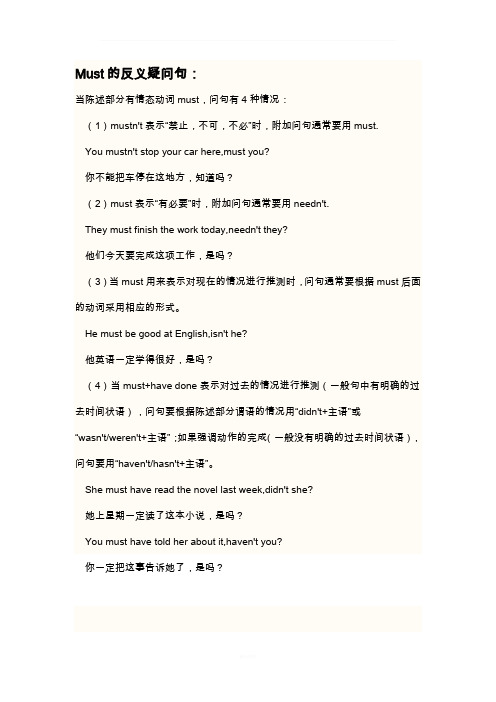
Must的反义疑问句:当陈述部分有情态动词must,问句有4种情况:(1)mustn't表示“禁止,不可,不必”时,附加问句通常要用must.You mustn't stop your car here,must you?你不能把车停在这地方,知道吗?(2)must表示“有必要”时,附加问句通常要用needn't.They must finish the work today,needn't they?他们今天要完成这项工作,是吗?(3)当must用来表示对现在的情况进行推测时,问句通常要根据must后面的动词采用相应的形式。
He must be good at English,isn't he?他英语一定学得很好,是吗?(4)当must+have done表示对过去的情况进行推测(一般句中有明确的过去时间状语),问句要根据陈述部分谓语的情况用“didn't+主语”或“wasn't/weren't+主语”;如果强调动作的完成(一般没有明确的过去时间状语),问句要用“haven't/hasn't+主语”。
She must have read the novel last week,didn't she?她上星期一定读了这本小说,是吗?You must have told her about it,haven't you?你一定把这事告诉她了,是吗?need的反义疑问句:need的用法分为两种,一种是作为情态动词,一种是作为实义动词。
一般而言,need作为情态动词是在否定句(有时为疑问句中),此种情况在反义疑问句中通常为need I或needn't I,而当这句话是一句肯定句是,这里的need就作为实义动词,通常为do you或者是don't you就比如LZ说的句子I needn’t tell you the answer , need I ?这里need为情态动词,前面否定,后用need肯定You need to buy a better dictionary , don’t you ? 这里need为实义动词,前面肯定,所以后面用do的否定形式don't说起will,我不明白LZ是什么意思,与will有关的知识点整理在这里开头为Let's,后面一定用shall +we例:Let's go,shall we开头为Let us,后面一定用will you例:Let us go,will youthink, believe, suppose, imagine, expect等动词后接宾语从句构成的主从复合句在构成反意疑问句时,视情况不同有两种不同的构成方式。
含情态动词must的反义疑问句
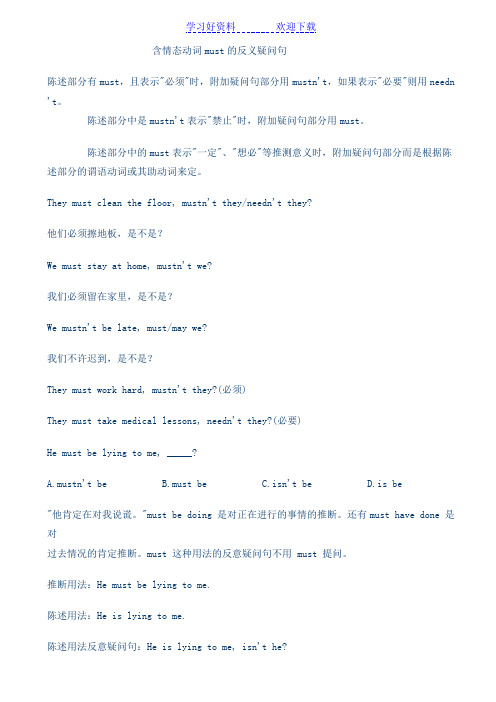
含情态动词must的反义疑问句陈述部分有must,且表示"必须"时,附加疑问句部分用mustn't,如果表示"必要"则用needn 't。
陈述部分中是mustn't表示"禁止"时,附加疑问句部分用must。
陈述部分中的must表示"一定"、"想必"等推测意义时,附加疑问句部分而是根据陈述部分的谓语动词或其助动词来定。
They must clean the floor, mustn't they/needn't they?他们必须擦地板,是不是?We must stay at home, mustn't we?我们必须留在家里,是不是?We mustn't be late, must/may we?我们不许迟到,是不是?They must work hard, mustn't they?(必须)They must take medical lessons, needn't they?(必要)He must be lying to me, _____?A.mustn't beB.must beC.isn't beD.is be"他肯定在对我说谎。
"must be doing 是对正在进行的事情的推断。
还有must have done 是对过去情况的肯定推断。
must 这种用法的反意疑问句不用 must 提问。
推断用法:He must be lying to me.陈述用法:He is lying to me.陈述用法反意疑问句:He is lying to me, isn't he?推断用法反意疑问句:He must be lying to me, isn't he?推断用法:He must have been abroad.陈述用法:He has been abroad.陈述用法反意疑问句:He has been abroad, hasn't he?推断用法反意疑问句:He must have been abroad, hasn't he?推断用法:He must have gone swimming yesterday.陈述用法:He went swimming yesterday.陈述用法反意疑问句:He went swimming yesterday, didn't he?推断用法反意疑问句:He must have gone swimming yesterday, didn't he?He must be a visitor, isn't he?(对现在情况的推测)You must have seen him at his birthday party yesterday, didn't you?(对过去情况的推测,且句中有过去的时间状语)You must have seen him at his birthday party,haven't you?(强调动作的完成)1 带have to 时,附加疑问用do 或have的相应形式, 用do 更常见。
反义疑问句的使用方法

反义疑问句的使用方法反义疑问句对于初中生来讲是一个难点,不易掌握。
那么你对反义疑问句了解多少呢?以下是由店铺整理关于反义疑问句的用法的内容,希望大家喜欢!含情态动词的反意疑问句1 、带 have to 时附加疑问用 do 或 have的相应形式 ,用 do 更常见.You don’t have to go to school on Sundays ,do you?We have to work today ,don’t we (haven’t we )2、带 must时A 表示“必须”,附加疑问部分用mustn’tWe must work hard ,mustn’t weB 表示“有必要”时,附加疑问部分用needn’t.The teacher must show concern for each pupil ,needn’t heC 表示“推测”时,附加疑问部分要与陈述部分的谓语动词相呼应.He must be a teacher,i sn’t heD must + have + done 是对过去情况的推测,当陈述部分没有明确的表示过去的时间状语时,附加疑问要用have的相应形式;当陈述部分有明确的过去时间状语时,附加疑问要用过去时.You must have lived here for a long time ,haven’t youYou must have seen him yesterday ,didn’t youE 当陈述部分是 must not ,表示“一定不要” 、“禁止”时,附加疑问除用must 外,还可以用may.I must not tell him ,must I ( may I )3 、带 used to 时附加疑问用usedn’t 或didn’t .但口语中倾向于后者.There used to be an apple tree in the garden ,didn’t there (usedn’t there )4 、带need 时附加疑问用 do 或 need ,应该与陈述部分 need 用法相呼应.I needn’t tell you the answer ,need IYo u need to buy a better dictionary ,don’t you5、带ought to 时附加疑问用ought.,但在美国英语中用shouldWe ought to help each other ,oughtn’t we / shouldn’t we 反义疑问句大合集1. 当陈述部分的主语是I,而句子又是用来征询对方的意见时,附加疑问句中的主语用you。
反义疑问句的特殊用法

A.当need 是及物动词的时候A fence needs the support of three stakes,doesn’t it?B.当 need 是情态动词的时候You needn’t come tomorrow morning,need you?2.must 的反义疑问句A.当must 表推测时You must be tired,aren’t you?must have done对已发生的过去情况的推测.若陈述句谓语部分有“must have done”,而且有表示过去的时间状语,问句部分用didn't;若没有表示过去的时间状语,问句部分用haven't或hasn't。
You must have made the mistake,haven’t you?They must have stayed at home last night,didn’t they?B.当must 为情态动词时You mustn’t walk on grass,must you?3.不定代词的反义疑问句A.指人的不定代词Everyone is having a good time,aren’t they?B.指物的不定代词1.Nothing serious happened,did it?2.Everything goes well,doesn’t it?4.判断反义主句还是从句A.主语是第I,从句反问I suppose you are not going today,are you?B.主语不是I,主句反问。
有些从句即使是I,但动词如果是tell,还是要主句反问。
I told them not everybody could do it,didn’t I?5.There used to be的反义疑问句There used to be bus stop on that corner,didn’t there?Pass me the dictionary,will you? Let’s go,shall we?Let us go,will you?。
Must be和 Must have done 的反义疑问句
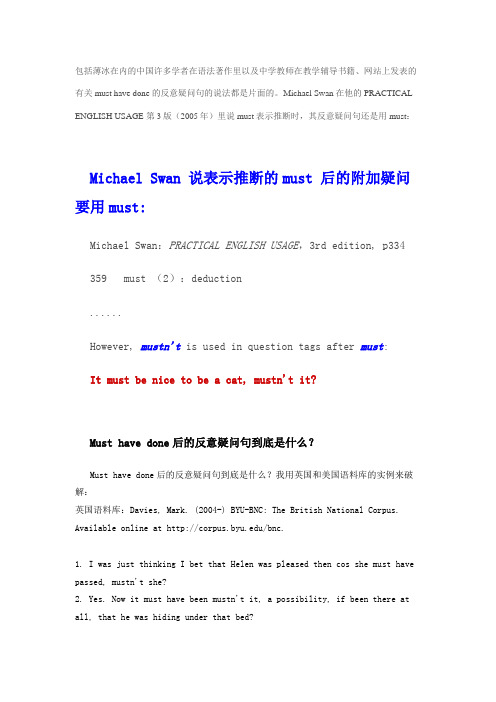
包括薄冰在内的中国许多学者在语法著作里以及中学教师在教学辅导书籍、网站上发表的有关must have done 的反意疑问句的说法都是片面的。
Michael Swan 在他的PRACTICAL ENGLISH USAGE 第3版(2005年)里说must表示推断时,其反意疑问句还是用must:Michael Swan 说表示推断的must 后的附加疑问要用must:Michael Swan:PRACTICAL ENGLISH USAGE,3rd edition, p334 359 must (2):deduction......However, mustn't is used in question tags after must:It must be nice to be a cat, mustn't it?Must have done后的反意疑问句到底是什么?Must have done后的反意疑问句到底是什么?我用英国和美国语料库的实例来破解:英国语料库:Davies, Mark. (2004-) BYU-BNC: The British National Corpus. Available online at /bnc.1. I was just thinking I bet that Helen was pleased then cos she must have passed, mustn't she?2. Yes. Now it must have been mustn't it, a possibility, if been there at all, that he was hiding under that bed?3. Exactly why, he must have had some sympathy, mustn't he?.4. …she must have passed mustn't she?5. He must have been interested in cooking, mustn't he?6. Yeah well I mean he must have gone in the hospital to her mustn't he?8. You must have touched her up the wrong way. --Yeah, I must have done mustn't I?9. Now it must have been mustn't it, a possibility, if been there at all, that he was hiding under that bed?10. Exactly why, he must have had some sympathy, mustn't he?.11. He must have been interested in cooking, mustn't he?12. Yeah well I mean he must have gone in the hospital to her mustn't he?13. Yeah, I must have done mustn't I?14. Somebody must have reported him, though, mustn't they?15. Abruptly she stood up and crossed to the window. "I must have done , mustn't I?"16. You must have seen the seals, though, didn't you?17. Exactly why, he must have had some sympathy , mustn't he ?.18. And your sister's ten years older than you so they must 've been there ten years plus , mustn't they ?19. They have a serious side but they must have a lighter side as well , mustn't they ?20. It must be , mustn't it ?21. Yeah. The profit would have been minus cos the costs would still be there so it must be a cancellation . Mustn't it ?22. Yes, now this shows it must be his imagination , mustn't it ?23. …they must know there is a risk , mustn't they .24. It must mean something , mustn't it ?25. Six pairs of knickers must be enough , mustn't it , Charlie?26. Then it must be Madame V in Paris , mustn't it ?27. Everybody who sees her must love her , mustn't they , Ellen?28. But he must like her a bit , mustn't he ?29. Saturday night. Yeah? Yeah. So he must be doing well, mustn’t he?30. Yeah. Okay. So what, they must be staying, staying the Saturday night, mustn’t they?31. You must have seen the seals, though, didn’t you?(用didn't的只搜到这一例)美国语料库:/1. You must have enjoyed those, didn't you?2. And you must have had a name, didn't you?3. Oh Patrick, I must have told you -- didn't I?4. Must have seemed like an eternity, didn't it, holding your breath?5. Must have had three kids, did she?6. I'm sure they must be exaggerating, aren't they, Professor?7. You must have called an undertaker by now, haven't you?结论: 用mustn't 构成反意疑问句见于英国英语。
中考英语反意疑问句单选题50题(含答案)

中考英语反意疑问句单选题50题(含答案)1.She is a student, isn't she?A.is sheB.isn't sheC.does sheD.doesn't she答案:B。
反意疑问句遵循“前肯后否,前否后肯”的原则。
本题前半句是肯定句,所以后半句用否定形式,且前半句中有be 动词is,后半句也用is 的否定形式isn't,主语不变还是she。
A 选项与前半句一样是肯定形式,错误;C 和D 选项助动词使用错误。
2.He likes apples, doesn't he?A.does heB.doesn't heC.is heD.isn't he答案:B。
前半句是肯定句,后半句用否定形式,前半句的谓语动词是likes,借助助动词does,后半句用doesn't he。
A 选项肯定形式错误;C 和D 选项be 动词错误。
3.They are happy, aren't they?A.are theyB.aren't theyC.do they答案:B。
前半句是肯定句,后半句用否定形式,前半句有be 动词are,后半句用aren't they。
A 选项肯定形式错误;C 和D 选项助动词错误。
4.She can swim, can't she?A.can sheB.can't sheC.does sheD.doesn't she答案:B。
前半句是肯定句,后半句用否定形式,前半句有can,后半句用can't she。
A 选项肯定形式错误;C 和D 选项助动词错误。
5.He will come, won't he?A.will heB.won't heC.does heD.doesn't he答案:B。
前半句是肯定句,后半句用否定形式,前半句有will,后半句用won't he。
musthavedone反义疑问句的用法归纳
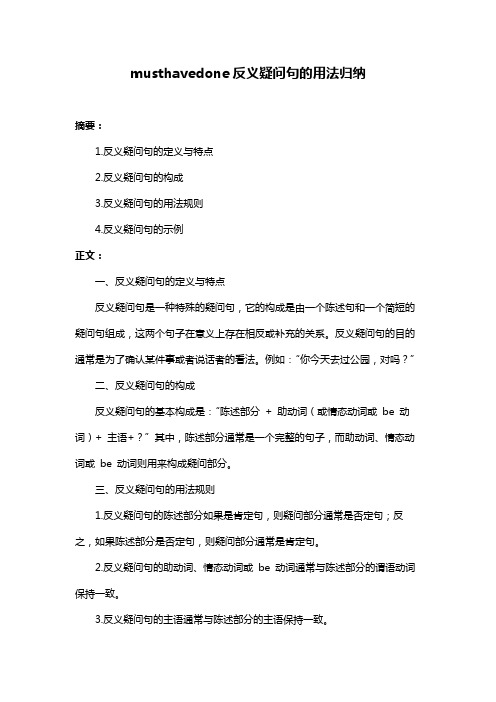
musthavedone反义疑问句的用法归纳
摘要:
1.反义疑问句的定义与特点
2.反义疑问句的构成
3.反义疑问句的用法规则
4.反义疑问句的示例
正文:
一、反义疑问句的定义与特点
反义疑问句是一种特殊的疑问句,它的构成是由一个陈述句和一个简短的疑问句组成,这两个句子在意义上存在相反或补充的关系。
反义疑问句的目的通常是为了确认某件事或者说话者的看法。
例如:“你今天去过公园,对吗?”
二、反义疑问句的构成
反义疑问句的基本构成是:“陈述部分+ 助动词(或情态动词或be 动词)+ 主语+?”其中,陈述部分通常是一个完整的句子,而助动词、情态动词或be 动词则用来构成疑问部分。
三、反义疑问句的用法规则
1.反义疑问句的陈述部分如果是肯定句,则疑问部分通常是否定句;反之,如果陈述部分是否定句,则疑问部分通常是肯定句。
2.反义疑问句的助动词、情态动词或be 动词通常与陈述部分的谓语动词保持一致。
3.反义疑问句的主语通常与陈述部分的主语保持一致。
四、反义疑问句的示例
1.肯定陈述句+ 否定疑问句
陈述句:她去过北京。
疑问句:她去过北京,对吗?
2.否定陈述句+ 肯定疑问句
陈述句:他不会游泳。
疑问句:他会游泳,对吗?
3.含有情态动词的反义疑问句
陈述句:你必须完成这个任务。
疑问句:你必须完成这个任务,对吗?
4.含有be 动词的反义疑问句
陈述句:他是老师。
疑问句:他是老师,对吗?
通过以上分析,我们可以看出反义疑问句在英语中的重要性和使用规则。
- 1、下载文档前请自行甄别文档内容的完整性,平台不提供额外的编辑、内容补充、找答案等附加服务。
- 2、"仅部分预览"的文档,不可在线预览部分如存在完整性等问题,可反馈申请退款(可完整预览的文档不适用该条件!)。
- 3、如文档侵犯您的权益,请联系客服反馈,我们会尽快为您处理(人工客服工作时间:9:00-18:30)。
对现在情况的推测,问句部分用主动词(do,be)一般现在时的适当形式。
若是现在进行时,问句部分用现在进行时的适当形式表示。
若是
there be结构,问句用isn't/aren't there。
如:
1)He must be there,isn't he?
2)He must have a big family,doesn't he?
3)He must be waiting outside,isn't he?
4)There must be some students in the room,aren't there?
二、对已发生的过去情况的推测,若陈述句谓语部分有“must have
done”,而且有表示过去的时间状语,问句部分用didn't;若没有表示过去的时间状语,问句部分用haven't或hasn't。
如:
1)They must have gone there last night,didn't they?
2)They must have arrived by now,haven't they?(根据by now来判断)
3)They must have been to the Great Wall,haven't they?
三、若是被动,应按被动结构来处理。
如:
1)The room must have been cleaned yesterday,wasn't it?
2)The room must have been cleaned,hasn't it?
四、若句中有表示过去完成时的时间状语,问句部分应用hadn't.如:
They must have learnt 5000 English words by the end of last term,
hadn't they?
(本题中must表推测,如果将它去掉,还原为真实句就是They had
learnt 5000 English words by the end of last term.因此,反意问句是
hadn't)。
